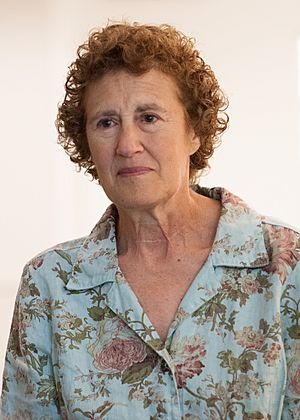Barbara Liskov facts for kids
Quick facts for kids
Barbara Liskov
|
|
|---|---|

Liskov in 2010
|
|
| Born |
Barbara Jane Huberman
November 7, 1939 Los Angeles, California, US
|
| Education | |
| Known for |
|
| Spouse(s) | Nathan Liskov (1970–) |
| Children | 1 |
| Awards |
|
| Scientific career | |
| Fields | Computer science |
| Institutions | Massachusetts Institute of Technology |
| Thesis | A Program to Play Chess End Games (1968) |
| Doctoral advisor | John McCarthy |
| Doctoral students |
|
Barbara Liskov (born November 7, 1939) is a famous American computer scientist. She has made huge contributions to how we create programming languages and build distributed computing systems. These are systems where many computers work together.
Her important work includes ideas like "abstract data types." This helps programmers organize information better. She also created the "Liskov substitution principle." This rule helps make computer programs more reliable and easier to change.
In 2008, Barbara Liskov received the Turing Award. This is the highest honor in computer science, like a Nobel Prize for computing. She was one of the first women in the United States to earn a Ph.D. in computer science. She was also the second woman ever to win the Turing Award. Today, she is a special professor at the Massachusetts Institute of Technology (MIT).
Contents
Early Life and Education
Barbara Liskov was born on November 7, 1939, in Los Angeles, California. She was the oldest of four children. She studied mathematics and physics at the University of California, Berkeley. She graduated in 1961.
At that time, not many women studied math or computer science. Barbara was one of only two girls in her math classes at Berkeley. She wanted to go to graduate school for math. Princeton University did not accept women in their math program back then. So, she moved to Boston.
In Boston, she started working at a company called Mitre Corporation. There, she became very interested in computers and programming. After a year, she took a programming job at Harvard University. She worked on programs that could translate languages.
She then decided to go back to school. She applied to Stanford University and was accepted. In March 1968, she made history. She became one of the first women in the United States to get a Ph.D. in computer science. She earned her degree from Stanford University. At Stanford, she worked with John McCarthy, a pioneer in artificial intelligence. Her Ph.D. project was about creating a computer program that could play chess endgames.
Career and Key Projects
After finishing her Ph.D., Barbara Liskov returned to Mitre Corporation. She worked there as a research scientist. Later, she joined the Massachusetts Institute of Technology (MIT).
She has led many important projects that changed how computers work. Here are some of her key contributions:
- Venus Operating System: This was a small, affordable system that allowed many users to share a computer at the same time.
- CLU Programming Language: She designed and built CLU. This language introduced important ideas like "abstract data types." These ideas help programmers create code that is more organized and easier to reuse.
- Argus Programming Language: Argus was the first high-level language designed to build programs that run across many different computers. This is called "distributed computing."
- Thor Database System: This was a special kind of database that stored information in an "object-oriented" way. This made it easier to manage complex data.
Barbara Liskov also worked with another scientist, Jeannette Wing. Together, they created the "Liskov substitution principle." This rule helps make sure that different parts of a computer program work correctly together. It is very important for building reliable software.
Today, she leads the Programming Methodology Group at MIT. Her research focuses on making sure computer systems can keep working even if parts of them fail. This is called "Byzantine fault tolerance" and "distributed computing."
Awards and Recognition
Barbara Liskov has received many honors for her groundbreaking work. She is a member of important groups like the National Academy of Engineering and the National Academy of Sciences. She is also a fellow of the American Academy of Arts and Sciences.
In 2002, MIT recognized her as one of their top women faculty members. Discover magazine also named her one of the 50 most important women in science that year.
In 2004, she won the IEEE John von Neumann Medal. This award recognized her fundamental contributions to programming languages and distributed systems. She also received honorary doctorates from several universities around the world.
The biggest award she received was the 2008 Turing Award. She got this award in March 2009. It was for her work in designing programming languages and software methods. Her ideas helped lead to the development of "object-oriented programming." This is a very popular way to write computer programs today. The award recognized her work on "data abstraction," "fault tolerance," and "distributed computing."
In 2012, she was inducted into the National Inventors Hall of Fame. In 2023, she received the Benjamin Franklin Medal. This award recognized her important contributions to computer programming. Her work helps create reliable and reusable computer programs.
Personal Life
Barbara Liskov married Nathan Liskov in 1970. They have one son, Moses. Moses also became a computer scientist. He earned his Ph.D. from MIT in 2004. He now teaches computer science at the College of William and Mary.
See also
 In Spanish: Barbara Liskov para niños
In Spanish: Barbara Liskov para niños
 | Selma Burke |
 | Pauline Powell Burns |
 | Frederick J. Brown |
 | Robert Blackburn |

